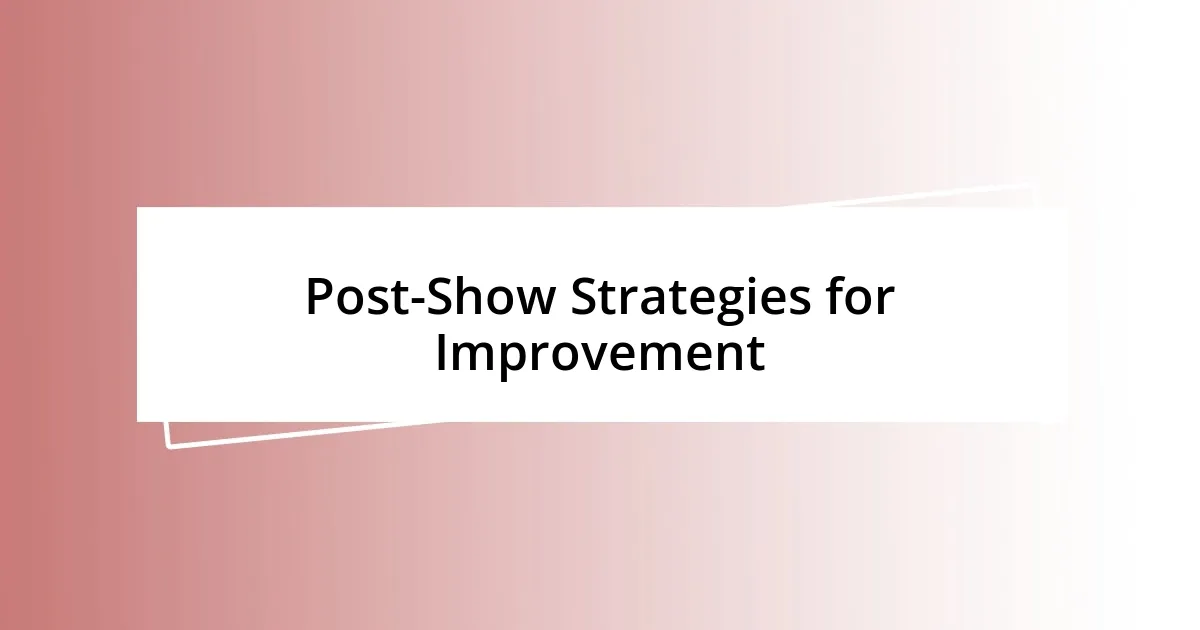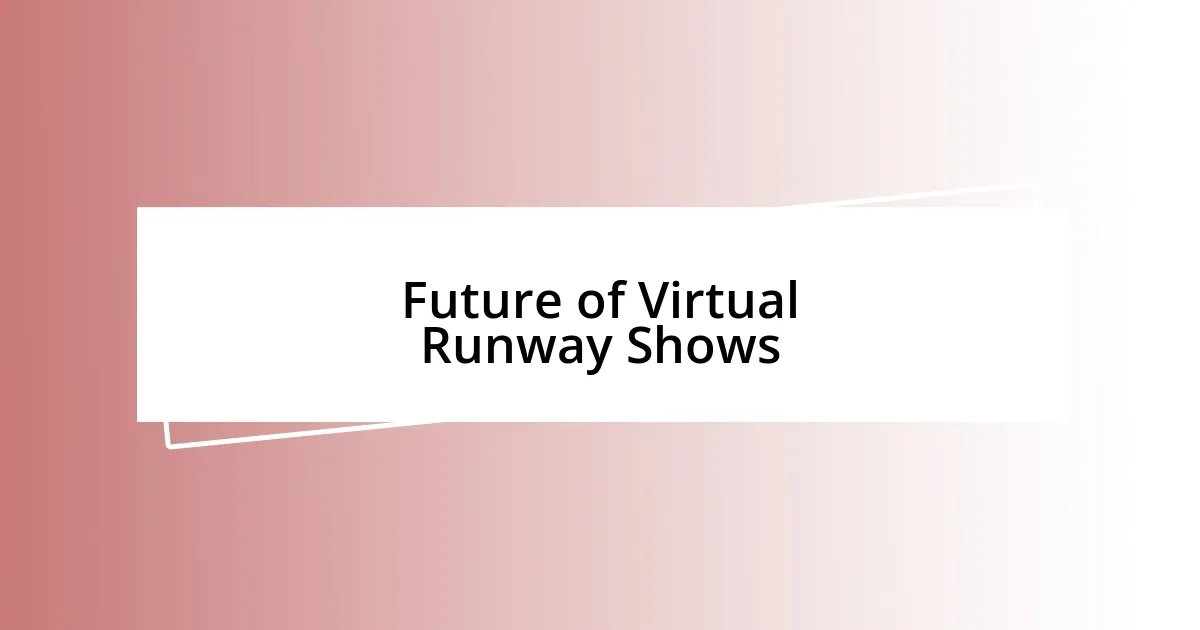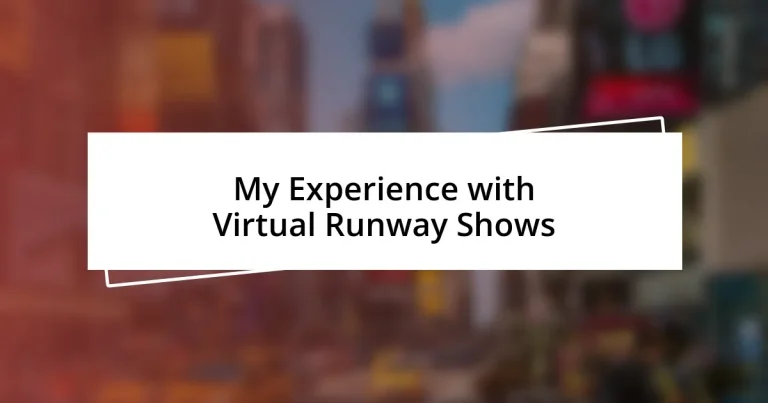Key takeaways:
- Virtual runway shows enhance accessibility, allowing global audiences to experience fashion without geographical barriers or high costs.
- Interactive elements such as live chats, polls, and Q&A sessions deepen viewer engagement and foster community connections.
- Post-show analysis and networking with designers enhance appreciation and understanding of fashion artistry.
- The future of virtual runway shows promises more immersive experiences, integrating augmented reality and AI personalization to enrich viewer interaction.

Introduction to Virtual Runway Shows
The rise of virtual runway shows has completely transformed the fashion industry, shifting the spotlight from physical presence to digital creativity. I remember watching my first virtual runway show, captivated by the seamless blend of technology and artistry—it was a game-changer for how fashion can be presented. Have you ever wondered how this new format can bring designers and audiences together in ways we never thought possible?
What struck me the most was how these shows make fashion more accessible. I found myself tuning into collections from designers I’d never heard of, all from the comfort of my living room. It’s an exciting prospect, isn’t it? Instead of being limited by geography, viewers can now enjoy a global showcase of talent, breaking down barriers that once seemed insurmountable.
Virtual runway shows also engage our emotions in a way that traditional formats sometimes miss. I recall the powerful storytelling that some designers conveyed through their digital settings, employing stunning visuals and soundtracks that left a lasting impression. This immersive experience invites us, as viewers, to connect not just with the clothes, but with the narratives behind them. How can we resist being drawn into a world where every detail is crafted to spark our imagination?

Benefits of Virtual Runway Experiences
The benefits of virtual runway experiences are truly remarkable. For instance, I was thrilled to discover that these shows often include interactive elements. During one particular event, I had the opportunity to vote for my favorite looks in real-time. This level of engagement made me feel like a part of the process, something I hadn’t experienced at physical shows.
Here are some key benefits I’ve experienced:
- Wider Accessibility: Viewers from all over can attend, regardless of location or opportunity.
- Cost-Effective: No need for travel, accommodation, or expensive tickets.
- Innovative Storytelling: Designers can use advanced technology to create immersive narratives that resonate deeply with audiences.
- Sustainable Practices: Fewer resources consumed compared to traditional shows, which is an advantage for the planet.
- Real-Time Interaction: Platforms often incorporate live chats or reactions, fostering a sense of community among viewers.
I find it exciting how these shows democratize fashion, giving everyone a front-row seat to creativity. One memorable show featured a designer who paired fashion with augmented reality, allowing viewers to see models walk not just on the catwalk, but also in their own living spaces. That sense of personal connection is definitely something I’ll cherish!

Tips for Participating Effectively
Participating effectively in virtual runway shows can really enhance your experience. One tip I found invaluable is to engage actively with the content. During a recent show, I made it a point to chat with other attendees in the live comment section. The conversations added a layer of excitement, and sharing thoughts in real-time made me feel more connected to the event and the community around it.
Another aspect is creating a comfortable viewing environment. I remember when I set up my living room with snacks, cozy blankets, and the best screen. It transformed the show into an event, much like a movie night. Just think about how much more enjoyable it is when you’re relaxed and focused. This isn’t a passive experience; it’s about immersing yourself fully.
Lastly, don’t shy away from exploring the interactive elements. I learned that many platforms allow you to interact with designers or even ask questions post-show. After one particularly striking presentation, I reached out to a designer via social media to express how much their work resonated with me. Their reply felt personal and affirmed my enthusiasm for the show, reinforcing the sense of connection we all crave.
| Tip | Description |
|---|---|
| Engage Actively | Participate in live chats and discussions to enhance your connection to the event. |
| Create a Comfortable Space | Set up a cozy viewing area to fully enjoy the experience as though it were a special occasion. |
| Explore Interactivity | Utilize interactive features to connect with designers and community members after the show. |

Engaging with Audience During Shows
Engaging with the audience during virtual runway shows takes the experience to another level. I remember a particular event where the host encouraged viewers to share their favorite looks using a specific hashtag. This simple call to action not only sparked a wave of creativity but also allowed each participant to feel like a contributor to the fashion dialogue. Have you ever felt that rush of excitement when your thoughts align with a wider community? I certainly did.
In another instance, I participated in a Q&A session with the designers immediately after the show. Knowing that I could ask about their inspirations or choices made me feel valued as a viewer. I couldn’t help but think about how much I admired the work behind each piece. It’s like having a backstage pass to the creative minds that fuel the fashion industry!
Additionally, the use of polls during the show was a delightful surprise. I vividly recall the thrill of casting my vote for the crowd favorite look. It’s fascinating how this feature not only makes the event interactive but also turns it into a collective experience where every voice is heard. Have you ever wished your opinion mattered in a larger context? Virtual runways truly grant us that wish by fostering an inclusive environment for all viewers.

Post-Show Strategies for Improvement
Reflecting on my experiences with virtual runway shows, I found that conducting a thorough post-show analysis can yield significant insights. After one show, I sat down with my notes and feedback from fellow attendees. It was eye-opening to see how others interpreted the designs differently than I did. This exploration deepened my understanding and appreciation of the artistry involved. Have you ever taken the time to dissect an event? You might be surprised by what you discover!
Another strategy I embraced was reaching out to fellow attendees for feedback. One time, I connected with someone via a group chat, and we compared our favorite moments from the show. This exchange was not only enlightening, but it also fostered a sense of community. It’s incredible how these shared discussions can illuminate different perspectives, isn’t it? Sometimes we do not realize how much we can learn from one another’s viewpoints.
Lastly, I found it beneficial to follow up with designers or show organizers on social media. After a particularly captivating show, I took a moment to compose thoughtful messages expressing my admiration for specific pieces. The responses I received varied from appreciation to further conversation about design choices. Such interactions not only enhanced my connection to the fashion world, but they also encouraged me to keep exploring and engaging. Isn’t it fulfilling to feel part of a dialogue that extends beyond the runway?

Future of Virtual Runway Shows
As I look to the future of virtual runway shows, I envision even more immersive experiences coming to life. Imagine being able to access augmented reality features that let you try on outfits through your screen. I once saw a demo where viewers could rotate 360 degrees in the designer’s creations, making me feel as if I were right there on the runway. What if that technology becomes commonplace? It would revolutionize how we shop by merging the excitement of a live show with the convenience of e-commerce.
Another exciting direction for virtual shows is the integration of AI that personalizes content based on viewer preferences. Reflecting on a past experience, I remember wishing I could see more of the styles that matched my taste. If future shows could adapt in real-time to highlight pieces that resonate with me, I can only imagine how much more engaged I’d feel. Wouldn’t it be fascinating to have fashion tailored to our unique desires before our eyes?
Moreover, I believe the sense of community will continue to thrive, with platforms facilitating real-time discussions among viewers. I recall an instance where the chat feature lit up with people from different backgrounds sharing their takes on the collections. It was like being in a digital café, surrounded by fellow fashion enthusiasts. Could this kind of global dialogue shape new trends and perspectives? I’m excited to think about the future where virtual runway shows aren’t just events but collaborations born from a shared love for fashion across borders.














